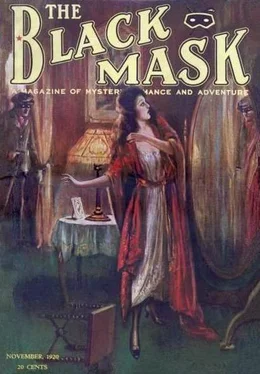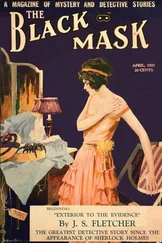Hamilton Craigie - The Black Mask Magazine (Vol. 2, No. 2 — November 1920)
Здесь есть возможность читать онлайн «Hamilton Craigie - The Black Mask Magazine (Vol. 2, No. 2 — November 1920)» весь текст электронной книги совершенно бесплатно (целиком полную версию без сокращений). В некоторых случаях можно слушать аудио, скачать через торрент в формате fb2 и присутствует краткое содержание. Город: New York, Год выпуска: 1920, Издательство: Pro-distributors Publishing Company, Жанр: Классический детектив, на английском языке. Описание произведения, (предисловие) а так же отзывы посетителей доступны на портале библиотеки ЛибКат.
- Название:The Black Mask Magazine (Vol. 2, No. 2 — November 1920)
- Автор:
- Издательство:Pro-distributors Publishing Company
- Жанр:
- Год:1920
- Город:New York
- ISBN:нет данных
- Рейтинг книги:5 / 5. Голосов: 1
-
Избранное:Добавить в избранное
- Отзывы:
-
Ваша оценка:
- 100
- 1
- 2
- 3
- 4
- 5
The Black Mask Magazine (Vol. 2, No. 2 — November 1920): краткое содержание, описание и аннотация
Предлагаем к чтению аннотацию, описание, краткое содержание или предисловие (зависит от того, что написал сам автор книги «The Black Mask Magazine (Vol. 2, No. 2 — November 1920)»). Если вы не нашли необходимую информацию о книге — напишите в комментариях, мы постараемся отыскать её.
The Black Mask Magazine (Vol. 2, No. 2 — November 1920) — читать онлайн бесплатно полную книгу (весь текст) целиком
Ниже представлен текст книги, разбитый по страницам. Система сохранения места последней прочитанной страницы, позволяет с удобством читать онлайн бесплатно книгу «The Black Mask Magazine (Vol. 2, No. 2 — November 1920)», без необходимости каждый раз заново искать на чём Вы остановились. Поставьте закладку, и сможете в любой момент перейти на страницу, на которой закончили чтение.
Интервал:
Закладка:
“I went to bed early. At eleven o’clock the doorbell rang. I slipped into my dressing gown and went down to answer it. It was—was him!
“Well, he wanted to know why I was not ready as I had promised, and kept saying over and over the train went at twelve and we would miss it if we did not hurry. I was so amazed, so terror-stricken, that I made no remonstrance when he came in and closed the door. I told him I did not understand what he meant by such action, when I finally gathered my senses.
“ ‘Aren’t you going with me, Helen?’ he demanded.
“ ‘Are you mad?’ I asked.
“ ‘I guess so, Helen,’ he said. ‘Mad with love of you. Hurry, Helen, for we are going away to happiness.’ That is just the way he put it.”
Again she paused, and her eyes fell to the floor. She presented a sad picture, as she struggled to repress her emotion.
“I finally got the straight of it. After the first note he had s, sent me another, proposing that we go away together. It did not come until the next day—he had taken the precaution to mail it in another town. He pleaded I should go anyway because of his love for me, and—and would not leave. He tried to take me in his arms. I ran upstairs to escape him, and he started to follow.
“Then I heard a car in the drive and — and I knew Mr. Lewis had come home. It was a terrible moment. I stopped on the stairs and begged Mr. Harley to go. Finally he seemed to comprehend the situation and turned to go down the stairs.
“But it was too late. The car stopped outside the garage and it seemed only a second before I heard Mr. Lewis on the rear porch. Mr. Harley had taken only two or three steps when Mr. Lewis opened the kitchen door. He came in quickly, wondering, I suppose, why there was a light in the hall. Maybe he heard us.
“Mr. Harley started to run for the front door. A rug slipped under him and he fell, striking his head on the floor. His neck must have been broken that way. I darted on upstairs. I did not dare stop. I hurried into my room and lay down. Then in a minute I heard a gasp from Mr. Lewis and — and a dull sound. I waited for perhaps thirty minutes, not knowing what to do. At last I crept downstairs.
“The hall light had been jostled out. I stumbled over something. I found the light and turned it on. Mr. Lewis’ body lay over Mr. Harley’s. I suppose Mr. Lewis had died from the shock, an act of providence.” The tears welled in her eyes.
“That’s about all of the story,” she sobbed. “Except, that after I had stared at them in dumb agony for what seemed an age, I came to realize they must not be found here. Frantically I paced up and down the hall, not knowing what to do. Then a heaven-sent idea came to me.
“I carried Mr. Lewis out and placed him in his car, just as he was found next morning. Then I half carried, half dragged Mr. Harley to the common, dodging in and out of the shadows. It was a moonlight night, and it seemed to me a thousand pairs of eyes were watching from each window. He was heavy, but I did not seem to notice that. My muscles were deadened with fear. Then I stole home to my misery like a hunted animal.”
She lay back against the divan, utterly weary and almost limp from her recital.
“But what of the money?” Dorgan managed to ask.
“That’s another miserable part of it,” she faltered. “Of course he took it — to go away on. I noticed it in his pocket, it made such a bulge. Something told me it was not his, and I felt I owed it to him to protect his name, when it was partly my fault that he did such a wild thing. So I took it. I remembered what he had told me about his sister. He had given me her address so that I might get in touch with her should anything happen to him. So I sent it to her. I went to Cincinnati personally and told the bank there to send it on, saying that it came from a bank in Ohio.
“That is all, Will. What is to become of me? Am I damned forever?” The tears were flowing down her cheeks.
“No, Helen, no. It has been cleared up to my satisfaction, and the state will not prosecute,” Thornton freely assured her. “In fact, there is nothing to prosecute on, since it is a private bank, and no one has lost anything but you. And what a terrible story! Perhaps you did not do right in concealing it so long, Helen. But I can understand, and I want to extend my sympathy. And we will go at once, for I do not want to intrude longer upon your sorrow.”
He rose, walked over and took her hand. A silent clasp, a homage to a sorrowing woman whom he had known as a romping schoolgirl—and he walked to the door.
Jim Dorgan’s face was a puzzle to see as he shook hands with Helen Lewis. There was an admixture of victory and defeat.
Outside, when they were seated and the machine was moving-off, Bill turned to his friend. He could not help gloating a little.
“Didn’t I tell you, Jim? Didn’t I tell you that Helen Lewis would not wittingly be a party to such a thing?”
“We both win—and we both lose,” Dorgan the “Bulldog” answered evasively. “But I’m satisfied. She’s a good woman, Bill, a good woman.”
Told in Glass
by G. S. Montanye
I
The neighbors on Christopher Square called him Old Man Johnson. He had a little basement shop where he dealt in second hand automobile parts. He lived in the rear of the store and the Square knew him as an inventor. It did not know what he invented, but it was accustomed to seeing a light in the store at all hours. If one looked down into the black areaway they could see the old man at work among his tools, his ragged gray beard drooping over his bench.
One day Christopher Square hummed with news concerning Old Man Johnson.
Big Harry Westley, the King of Con Men, discussed the news with Lefty Blumfeld, alias Morrison Taylor, over a table in the front room of the West Side Social Club, located at the end of the Square. Westley was large, florid and impressive. Crookdom respected his genius. It was said that Westley could cut Central Park up into building lots and sell them for cash. He had served two jail terms, but had lost none of his nerve or pompous exterior.
Lefty Blumfeld, alias Morrison Taylor, was undersized. He was built along the lines of a gorilla. He had a low, bulging forehead and beady black eyes. His bull neck was short and thick. His hands were covered with coarse black hair. They were gnarled and pitted from laboratory work. He made nitro-glycerine for petermen and blasters when he was not out on a job himself. He had done a stretch of six years in the State penitentiary and was as rapacious and merciless as a coiled cobra.
“Did you hear the news about Old Man Johnson?” Westley inquired, lighting a fat cigar with a flourish.
Blumfeld tossed off three fingers of underground rye whiskey. He dried his lips on the back of his hand.
“No. What about him?”
The big con man tilted back his chair and chuckled.
“Everyone is talking about Old Man Johnson. He sold an invention to some big company up the state. He’s been paid ten thousand dollars in advance royalties. Charlie Hill saw the check and so it’s not air. The old geezer has cleaned up. Ten grands — I guess that’s rotten.”
Blumfeld ran his finger around the inside rim of his whiskey glass.
“What’s the invention?” he asked after a pause.
Westley shook his head and shrugged.
“Search me. Nobody seems to know. Charlie Hill asked him, but Johnson said it was a secret. It must be something good or he wouldn’t have got such dough.”
Blumfeld nodded moodily.
“Yes, it must be,” he said.
Westley flicked the ash from the end of his cigar and chuckled again.
“Ten thousand dollars,” he observed reflectively, “is a lot of dough. I’ll have to wander up to Moy Ling’s after awhile and smoke a couple of pipes of scamish. Poppy makes me dream clever schemes. I was full of hop the time I took that Florida lawyer for his currency kick. Old Man Johnson isn’t used to sudden wealth. I’ll dream out a way to separate him from his cush. When I get it I’ll buy you the best dinner in town, Lefty.”
Читать дальшеИнтервал:
Закладка:
Похожие книги на «The Black Mask Magazine (Vol. 2, No. 2 — November 1920)»
Представляем Вашему вниманию похожие книги на «The Black Mask Magazine (Vol. 2, No. 2 — November 1920)» списком для выбора. Мы отобрали схожую по названию и смыслу литературу в надежде предоставить читателям больше вариантов отыскать новые, интересные, ещё непрочитанные произведения.
Обсуждение, отзывы о книге «The Black Mask Magazine (Vol. 2, No. 2 — November 1920)» и просто собственные мнения читателей. Оставьте ваши комментарии, напишите, что Вы думаете о произведении, его смысле или главных героях. Укажите что конкретно понравилось, а что нет, и почему Вы так считаете.












